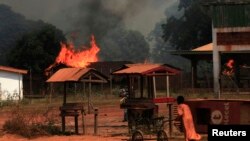The number of displaced people in Central African Republic is edging closer to one-million, as insecurity and fighting continue. Armed Muslim and Christian groups continue to battle in the capital and elsewhere, but are also targeting civilians. Humanitarian agencies are having a difficult time reaching those in need.
U.N. refugee agency spokesman Babar Baloch says the number of displaced people has risen sharply in recent weeks.
“On 24th of December, we had 710,000 displaced in the country. Today that number has [risen] to over 935,000 people, who are displaced inside CAR,” he said.
Former Seleka rebels, who are Muslim, are fighting armed Christian groups known as anti-Balaka. Early last year, the rebels, led by Michel Djotodia, toppled then-president Francois Bozize. Mr. Djotodia is now president and has incorporated some of the rebels into the army. However, he has no control over those who were not. The ex-Seleka rebels began attacking civilians, which led to the rise of the anti-Balaka groups. Now civilians on both sides are being targeted. Inter-communal violence has been heavy since December 5th.
“Violence, looting, killings just continue unabated,” said Baloch.
Most of the displaced in Central African Republic are in the capital.
“In Bangui today we have over half a million people, who are displaced. Around a hundred thousand of those are seeking refuge at Bangui’s international airport, while others are spread in the host communities,” he said.
The UNHCR said the violence has made it very difficult to reach those host families and deliver aid. Most of the displaced in Bangui are spread out over 67 different locations.
In Bossangoa – some 300 kilometers north of the capital – fighting and looting continue as well. The number of displaced people has been on the rise there, too.
UNHCR said that better security is essential for aid agencies to do their jobs. The U.N. agency and other aid groups are relying on the African Union peacekeeping force – known as MISCA – which may soon number 6,000.
UNHCR has organized airlifts to bring tents, blankets, plastic sheets and other supplies from regional warehouses in Nairobi, Accra, Dubai and Doula. However, insecurity at the airport could delay distribution of those supplies.
UNHCR’s Baloch said tens of thousands of people fled the country last year.
“Since the violence broke out in the country March 2013 till now, we have around 75,000 people that have fled the Central African Republic to the neighboring countries.”
That’s raised the total number of CAR refugees in DRC, Chad Cameroon and elsewhere to about 240,000.
U.N. refugee agency spokesman Babar Baloch says the number of displaced people has risen sharply in recent weeks.
“On 24th of December, we had 710,000 displaced in the country. Today that number has [risen] to over 935,000 people, who are displaced inside CAR,” he said.
Former Seleka rebels, who are Muslim, are fighting armed Christian groups known as anti-Balaka. Early last year, the rebels, led by Michel Djotodia, toppled then-president Francois Bozize. Mr. Djotodia is now president and has incorporated some of the rebels into the army. However, he has no control over those who were not. The ex-Seleka rebels began attacking civilians, which led to the rise of the anti-Balaka groups. Now civilians on both sides are being targeted. Inter-communal violence has been heavy since December 5th.
“Violence, looting, killings just continue unabated,” said Baloch.
Most of the displaced in Central African Republic are in the capital.
“In Bangui today we have over half a million people, who are displaced. Around a hundred thousand of those are seeking refuge at Bangui’s international airport, while others are spread in the host communities,” he said.
The UNHCR said the violence has made it very difficult to reach those host families and deliver aid. Most of the displaced in Bangui are spread out over 67 different locations.
In Bossangoa – some 300 kilometers north of the capital – fighting and looting continue as well. The number of displaced people has been on the rise there, too.
UNHCR said that better security is essential for aid agencies to do their jobs. The U.N. agency and other aid groups are relying on the African Union peacekeeping force – known as MISCA – which may soon number 6,000.
UNHCR has organized airlifts to bring tents, blankets, plastic sheets and other supplies from regional warehouses in Nairobi, Accra, Dubai and Doula. However, insecurity at the airport could delay distribution of those supplies.
UNHCR’s Baloch said tens of thousands of people fled the country last year.
“Since the violence broke out in the country March 2013 till now, we have around 75,000 people that have fled the Central African Republic to the neighboring countries.”
That’s raised the total number of CAR refugees in DRC, Chad Cameroon and elsewhere to about 240,000.





